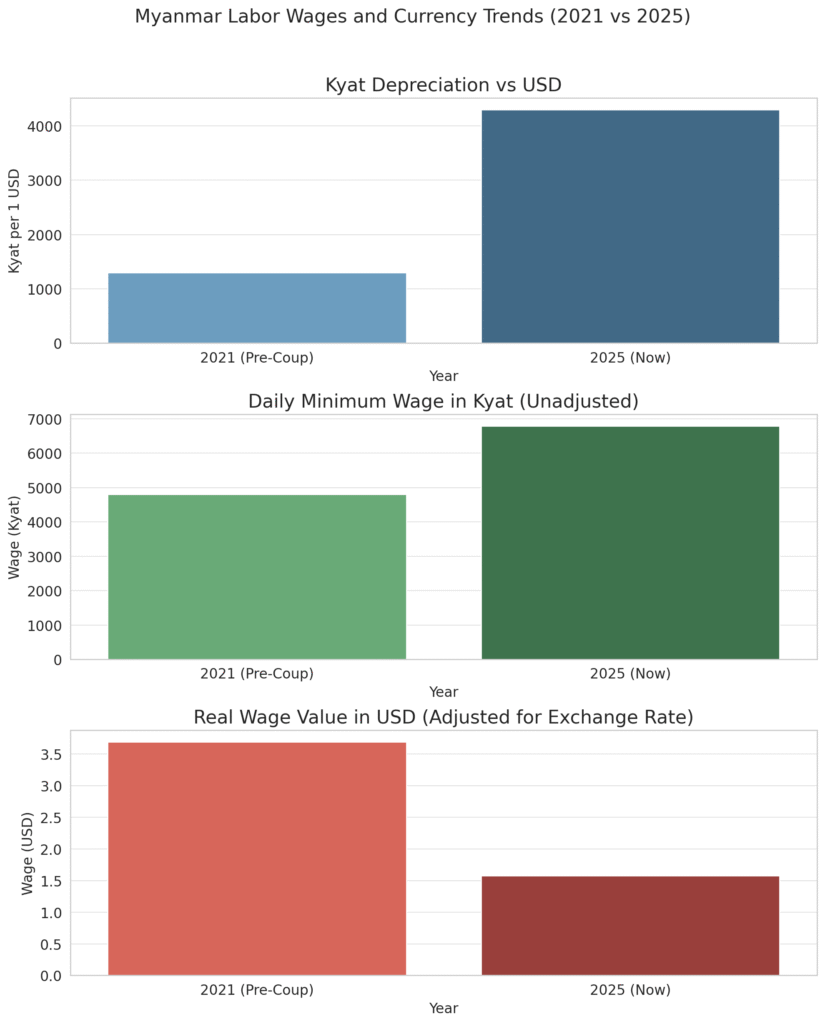“Myanmar Spring Chronicle – June 4 View”
(MoeMaKa, June 5, 2025):
Renewed Labor Protests Calling for Wage and Daily Rate Increases
Despite ongoing economic turmoil and the continued depreciation of the Myanmar kyat following the military coup, the country’s legal minimum wages for factory workers have not increased in proportion to inflation. This has led to a new wave of labor protests, particularly in industrial zones around Yangon.
At the time of the coup in early 2021, one U.S. dollar was worth about 1,300 kyat, and the daily minimum wage was 4,800 kyat—equivalent to about $3.69. Over four years later, the exchange rate has climbed to around 4,300 kyat per dollar, but the minimum wage has only increased to 6,800 kyat, which is now worth just $1.58 a day.
This means that in real terms, daily wages have been halved compared to four years ago. While the prices of rice, cooking oil, meat, fish, vegetables, medicine, and transportation have surged alongside the exchange rate, wages have remained stagnant. In response, workers’ unions and labor activists have led protests in recent weeks, achieving some wage increases, with some factories now offering daily wages of 11,500 to 12,000 kyat. However, even 12,000 kyat only amounts to about $2.79—still below pre-coup levels.
The reasons behind the ineffectiveness of previous wage protests and labor rights campaigns over the past four years can be traced to two main factors:
-
The military regime views wage-related activism as political dissent and has arrested union leaders and activists.
-
The military’s suppression of early post-coup labor protests in industrial zones such as Hlaing Tharyar and Shwepyithar set a precedent for repression, discouraging further mobilization.
Due to these crackdowns, labor rights activism declined sharply, and workers were forced to toil under severe inflation with stagnant wages.
On the other hand, factory owners have faced increased power outages, fuel shortages, and soaring logistics costs since the coup. They often make up for reduced profits by keeping wages low, creating an exploitative dynamic.
The ongoing armed conflict has destabilized rural areas, causing urban labor supply to swell as people flee war-affected regions in search of work. Employers have used this labor surplus to their advantage, keeping wages suppressed.
International labor organizations like the ILO have taken notice of Myanmar’s deteriorating labor rights situation. The junta could face international sanctions as a result—perhaps prompting the regime to tolerate recent wage protests.
Foreign investors are often drawn to Myanmar’s low wages, especially in garment, footwear, and manufacturing sectors. In Thailand, where food and consumer prices are similar to Myanmar, the minimum daily wage is around 370 baht (approx. 48,000 kyat), whereas Myanmar offers just 6,800 kyat—making it more profitable for investors to relocate operations to Myanmar.
While foreign investment is generally welcome, it’s crucial that the resulting profits do not come at the cost of already-meager wages paid to workers.
Many factory workers are displaced people who have fled from their homes and villages due to war. They now work in urban areas with no better alternatives. It is essential to ensure that these vulnerable workers are not exploited by being forced to accept unfairly low wages.


